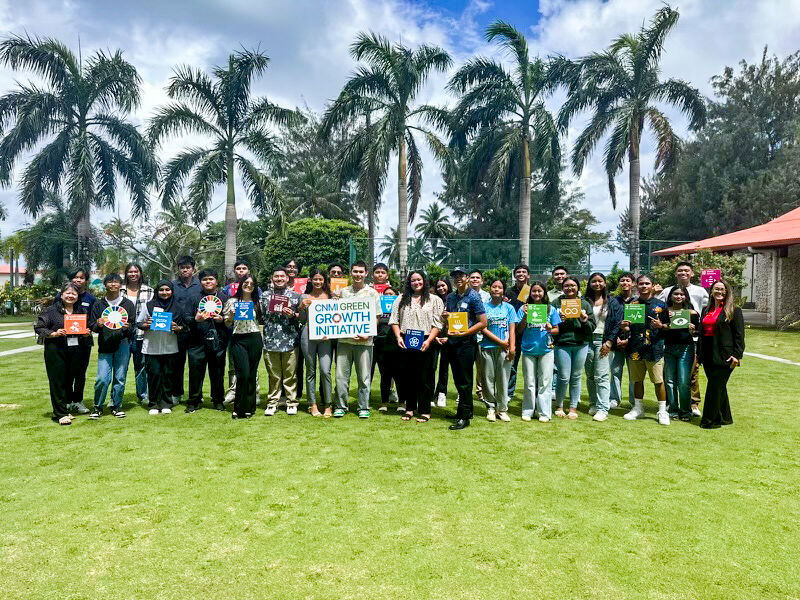
Public and private school students, along with their advisers and Public School System personnel, came together on June 9, 2025 for the CNMI Green Growth Convening.
PSS photo
STUDENTS from both public and private schools took an active role in the recent CNMI Green Growth Convening, sharing their ideas to foster environmental sustainability.
Held at the Crowne Plaza Resort on June 9, the convening brought together various stakeholders to discuss progress on the Green Growth Initiative, which aims to address pressing environmental challenges while promoting sustainable practices across the islands. High school and middle school students engaged with leaders, offering ideas and brainstorming solutions to improve island communities.
The students also mingled and interacted with environmental leaders and advocates from American Samoa, Guam, Chuuk, Palau, Yap, Pohnpei, the Marshall Islands, and Kosrae.
Trixia Singca, a student from Marianas High School, reflected on the significance of the event:
“It was really encouraging seeing what our leaders were doing to keep up with the changing climate — especially during a time when the islands are facing a lot of social, economic, and environmental hardships. It was reassuring to see that our leaders had the CNMI first in every decision they made.”
Singca added that the convening had a strong impact on younger leaders, inspiring them to think about sustainable living both at home and in school.
“It was also inspiring for us, the younger leaders, and it prompted us to think about how we can contribute to living sustainably, whether it’s in our own homes or schools. We were able to brainstorm and think of different ways we can positively impact our islands through small actions,” she said.
She added: “With the Green Growth Initiative, other student leaders and I were not only able to connect with the representatives and leaders on the island, but we were also able to start planning how we can better our islands.”
Tini Wabol, a student at Chacha Ocean View Middle School, shared her insights on food sustainability.
“I found out that about 90 percent of our food is imported, which made me realize how important it is to grow more crops locally,” Wabol said.
She noted a significant commitment from the Public School System to incorporate locally produced food into student meals by next year — an effort that highlights growing support for local agriculture.
Wabol also said she learned about MANGO, the Marianas Alliance of Non-Profit Organizations, which supports nonprofits in the CNMI and plays an important role in strengthening the community.
“Overall, the workshop taught me a lot about sustainability, local efforts, and how we can all contribute to a greener future,” Wabol added.
The PSS Child Nutrition Program has already been utilizing locally grown products in the public schools’ free meal program, working with vendors on Saipan, Tinian, and Rota. The Board of Education has committed to ensuring that healthy, locally grown products continue to be incorporated into school meals.
STEM and sustainability
Mai Peters, a student at Saipan Southern High School, said the convening gave her a broader perspective as she considers majoring in Natural Science Management after high school.
“We, the students, were taken to a separate room to create policies that would better our environment and schools,” she said.
Peters noted that some students proposed introducing STEM classes from elementary through high school as an “educational initiative” aligned with sustainability goals.
“It will be important that we collaborate with youth leaders from both schools and the youth congress to help support this initiative,” she said.
The CNMI Green Growth Initiative — first developed by the United Nations Environment Program — focuses on goals such as no poverty, zero hunger, good health and well-being, quality education, gender equality, clean water and sanitation, affordable and clean energy, industry, innovation and infrastructure, reduced inequalities, sustainable cities and communities, and economic growth. A central aim is to involve the younger generation in these critical discussions.
A seat at the table
Students play a critical role in shaping the future of environmental sustainability, said Student Representative to the Board of Education and Youth Congress Speaker Vinnie Juan Sablan.
“One of my main takeaways from the Green Growth Initiative was that the youth of the Pacific deserve a seat at the table for discussions on environmental awareness and impacts,” Sablan said.
He believes students understand what is at stake.
“People my age know what’s at risk — and we’re ready to take action.”
Sablan added that the initiative enhances engagement between students and community leaders.
“We bring fresh ideas, lived experiences, and a deep love for our islands,” he said. “We aren’t just students, volunteers, or interns — we are partners.”
Sablan said he and his peers left the event feeling hopeful.
“To know that our leaders and community members are doing their part to address environmental issues makes me feel hopeful and responsible,” he said, adding that the experience inspired him to pursue a career in medicine, advocacy, or leadership.
“It encourages me…to give back to the land and ocean that raised me.”
When asked about the future of such initiatives, Sablan emphasized the importance of intergenerational inclusion.
“The youth aren’t just the future — we’re already here, already doing the work,” he said.
He said programs like the Conference on Island Sustainability are vital for collaboration and idea-sharing among students, leaders, and advocates.
“Support, trust, and meaningful involvement in decision-making are key,” Sablan said.










